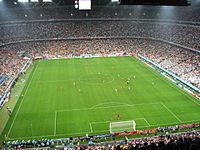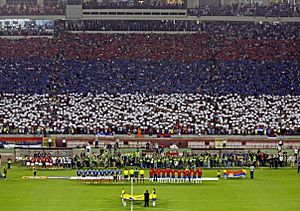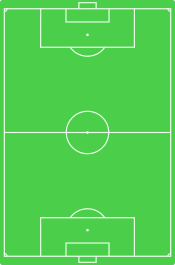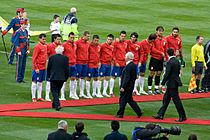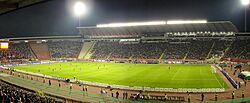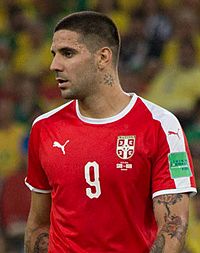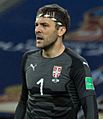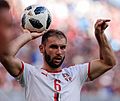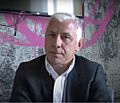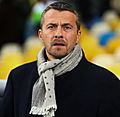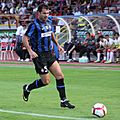Serbia national football team facts for kids
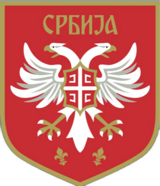 |
|||||||||||||||||||||||||||||||||||||||||||||||
| Nickname(s) | Орлови / Eagles | ||||||||||||||||||||||||||||||||||||||||||||||
|---|---|---|---|---|---|---|---|---|---|---|---|---|---|---|---|---|---|---|---|---|---|---|---|---|---|---|---|---|---|---|---|---|---|---|---|---|---|---|---|---|---|---|---|---|---|---|---|
| Association | Fudbalski savez Srbije (FSS) | ||||||||||||||||||||||||||||||||||||||||||||||
| Confederation | UEFA (Europe) | ||||||||||||||||||||||||||||||||||||||||||||||
| Head coach | Dragan Stojković | ||||||||||||||||||||||||||||||||||||||||||||||
| Captain | Aleksandar Mitrović | ||||||||||||||||||||||||||||||||||||||||||||||
| Most caps | Dušan Tadić (111) | ||||||||||||||||||||||||||||||||||||||||||||||
| Top scorer | Aleksandar Mitrović (62) | ||||||||||||||||||||||||||||||||||||||||||||||
| Home stadium | Various | ||||||||||||||||||||||||||||||||||||||||||||||
| FIFA code | SRB | ||||||||||||||||||||||||||||||||||||||||||||||
|
|||||||||||||||||||||||||||||||||||||||||||||||
| FIFA ranking | |||||||||||||||||||||||||||||||||||||||||||||||
| Current | 31 |
||||||||||||||||||||||||||||||||||||||||||||||
| Highest | 6 (December 1998) | ||||||||||||||||||||||||||||||||||||||||||||||
| Lowest | 101 (December 1994) | ||||||||||||||||||||||||||||||||||||||||||||||
| Elo ranking | |||||||||||||||||||||||||||||||||||||||||||||||
| Current | 19 |
||||||||||||||||||||||||||||||||||||||||||||||
| Highest | 4 (June 1998) | ||||||||||||||||||||||||||||||||||||||||||||||
| Lowest | 47 (October 2012) | ||||||||||||||||||||||||||||||||||||||||||||||
| First international | |||||||||||||||||||||||||||||||||||||||||||||||
| as Yugoslavia (Antwerp, Belgium; 28 August 1920) as FR Yugoslavia/Serbia and Montenegro (Porto Alegre, Brazil; 23 December 1994) (Podgorica, Serbia and Montenegro; 12 February 2003) as Serbia Unofficial (Belgrade, Yugoslavia; 3 September 1945) Official (Uherské Hradiště, Czech Republic; 16 August 2006) |
|||||||||||||||||||||||||||||||||||||||||||||||
| Biggest win | |||||||||||||||||||||||||||||||||||||||||||||||
| as Yugoslavia (Curitiba, Brazil; 14 June 1972) as FR Yugoslavia/Serbia and Montenegro (Toftir, Faroe Islands; 6 October 1996) (Belgrade, Serbia and Montenegro; 13 October 2004) as Serbia (Baku, Azerbaijan; 17 October 2007) (Belgrade, Serbia; 19 November 2008) (Belgrade, Serbia; 10 October 2009) (Novi Sad, Serbia; 11 September 2012) (Belgrade, Serbia; 18 November 2020) |
|||||||||||||||||||||||||||||||||||||||||||||||
| Biggest defeat | |||||||||||||||||||||||||||||||||||||||||||||||
|
as Yugoslavia (Antwerp, Belgium; 28 August 1920) (Paris, France; 26 May 1924) (Prague, Czechoslovakia; 28 October 1925) as FR Yugoslavia/Serbia and Montenegro (Rotterdam, Netherlands; 25 June 2000) (Prague, Czech Republic; 6 September 2002) (Gelsenkirchen, Germany; 16 June 2006) as Serbia (Lviv, Ukraine; 7 June 2019) |
|||||||||||||||||||||||||||||||||||||||||||||||
| World Cup | |||||||||||||||||||||||||||||||||||||||||||||||
| Appearances | 13 (first in 1930) | ||||||||||||||||||||||||||||||||||||||||||||||
| Best result | As Yugoslavia: Fourth place (1930, 1962) As FR Yugoslavia/Serbia and Montenegro: Round of 16 (1998) As Serbia: Group stage (2010, 2018, 2022) |
||||||||||||||||||||||||||||||||||||||||||||||
| European Championship | |||||||||||||||||||||||||||||||||||||||||||||||
| Appearances | 6 (first in 1960) | ||||||||||||||||||||||||||||||||||||||||||||||
| Best result | As Yugoslavia: Runners-up (1960, 1968) as FR Yugoslavia/Serbia and Montenegro: Quarter-finals (2000) As Serbia: Group stage (2024) |
||||||||||||||||||||||||||||||||||||||||||||||
|
Medal record
|
|||||||||||||||||||||||||||||||||||||||||||||||
The Serbia men's national football team represents Serbia in international football games. It is controlled by the Football Association of Serbia, which is the main organization for football in Serbia. The team is often called "the Eagles" (Orlovi in Serbian).
After the country of Yugoslavia broke up in 1992, Serbia and Montenegro formed a new country called FR Yugoslavia. Their football team was not allowed to play in tournaments like Euro 1992 and the 1994 World Cup due to international rules. They played their first friendly game in December 1994.
The team later played in the 1998 World Cup, reaching the Round of 16, and the quarter-finals at Euro 2000. They also played in the 2006, 2010, 2018, and 2022 FIFA World Cups, but did not get past the group stage.
From 2003 to 2006, the team was known as Serbia and Montenegro. After Montenegro became an independent country in 2006, the team was officially renamed the Serbia national football team. FIFA and UEFA see Serbia as the official team that continues the history of the FR Yugoslavia/Serbia and Montenegro teams, and also the older Yugoslavia teams.
Contents
- Team History: From Yugoslavia to Serbia
- Football Rivalries
- Team Look and Feel
- Team Management
- Current Players
- Player Records
- Notable Players
- Competition Records
- Team Achievements
- See also
Team History: From Yugoslavia to Serbia
Serbia's Football Journey with Yugoslavia (1920–1992)
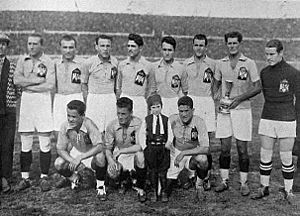
The Football Federation for the Kingdom of Yugoslavia was started in 1919. The first Serb player to play for the national team was Jovan Ružić in 1920. This first game was a big 7–0 loss to Czechoslovakia at the 1920 Summer Olympics in Belgium.
In 1930, there was a disagreement about moving the football headquarters. This led to some players boycotting the 1930 World Cup. The Serbian team, led by coach Boško Simonović, mostly had players from Belgrade clubs. They did very well, reaching the semi-finals, where they lost to the host country, Uruguay, 6–1.
After World War II, football started again. In 1945, a Serbian team won a tournament held to celebrate the end of the war. The reunited Yugoslavia team reached the finals of the UEFA European Championship in 1960 and 1968. They also finished fourth at the 1962 FIFA World Cup. Many Serbian players were important parts of the Yugoslavia team until the country broke up in the 1990s.
FR Yugoslavia and Serbia & Montenegro Era (1992–2006)
When the Federal Republic of Yugoslavia (Serbia and Montenegro) was formed in 1992, its sports teams were banned from international events due to international rules. This meant the football team could not play until December 1994. Their first game was a 2–0 loss to Brazil.
1998 World Cup Performance
After the ban was lifted, FR Yugoslavia joined FIFA and UEFA in 1994. They played in the 1998 World Cup qualifiers. They finished second in their group behind Spain. They then won a play-off against Hungary with a huge 12–1 total score, which helped them qualify for the World Cup.
At the World Cup, they were in a group with Germany, the United States, and Iran. They won their first game 1–0 against Iran. They drew 2–2 with Germany after being ahead 2–0. They then beat the United States 1–0. They finished second in their group.
In the Round of 16, they played against the Netherlands. The game was tied 1–1, but Predrag Mijatović missed a penalty kick. In the last moments of the game, the Netherlands scored, and Yugoslavia lost 2–1.
Euro 2000 Journey
For the Euro 2000 qualifiers, Yugoslavia was in a group with Croatia, which was the first time these two teams played after Yugoslavia broke up. The team qualified for Euro 2000 after a 2–2 draw with Croatia in their final group game.
At the Euro 2000 finals, Yugoslavia was in a group with Spain, Norway, and Slovenia. In their first game, they were losing 3–0 to Slovenia but managed to come back and draw 3–3. They then beat Norway 1–0. In their last group game, they lost a thrilling match 4–3 to Spain. Despite the loss, they finished second in the group and moved to the quarter-finals.
In the quarter-finals, they faced the Netherlands again and lost 6–1. Even though they were eliminated, Savo Milošević was one of the top goal scorers of the tournament with five goals.
2006 World Cup Qualification
For the 2006 World Cup qualifiers, the team was known as Serbia and Montenegro. They had a fantastic qualifying campaign, winning six games and drawing four, finishing first in their group without losing any matches. They also had the best defense, letting in only one goal in ten games.
Just before the World Cup started, Montenegro declared its independence from Serbia. It was decided that the Serbia and Montenegro team would still play in the tournament. In the group stage, they lost their first game 1–0 to the Netherlands. They then suffered a big 6–0 loss to Argentina, which was their worst international result ever. They also lost their final group game 3–2 to Ivory Coast, finishing the tournament with no points.
Independent Serbia (2006–Present)
After Montenegro became independent, Serbia played its first game as an independent nation, winning 3–1 against the Czech Republic.
2010 World Cup Success
Under coach Radomir Antić, Serbia had a strong World Cup qualification campaign. They were in a group with France, Romania, Austria, Lithuania, and the Faroe Islands. They played very well and qualified directly for the 2010 FIFA World Cup in South Africa. They secured their spot with a big 5–0 win at home against Romania.
At the 2010 World Cup, Serbia was in a group with Ghana, Germany, and Australia. They lost their first game 1–0 to Ghana. In their second match, they achieved a famous 1–0 victory against Germany, with a goal from Milan Jovanović. This win was called "the most famous day in Serbia's footballing history" by FIFA's official YouTube channel.
Serbia needed just one point in their last group game against Australia to reach the knockout stages. However, they lost 2–1 and finished last in their group.
Euro 2012 and 2014 World Cup Campaigns
Serbia did not qualify for Euro 2012. They finished one point behind Estonia in their qualifying group.
For the 2014 FIFA World Cup qualifiers, Serbia was in a tough group with Croatia, Belgium, Scotland, Macedonia, and Wales. Key players like Dejan Stanković and Nemanja Vidić retired from international football before this campaign. Serbia finished third in their group, missing out on a play-off spot.
Euro 2016 and 2018 World Cup Journeys
Serbia also failed to qualify for UEFA Euro 2016. A controversial game against Albania was stopped due to crowd trouble and later awarded as a 3–0 win to Albania by the Court of Arbitration for Sport. This decision hurt Serbia's chances.
For the 2018 FIFA World Cup qualifiers, Serbia was in a group with Wales, Austria, Ireland, Georgia, and Moldova. They started well and finished at the top of their group, qualifying for the 2018 tournament in Russia.
At the World Cup, Serbia won their first game 1–0 against Costa Rica. However, they lost their next two matches, 2–1 to Switzerland and 2–0 to Brazil, which meant they were eliminated in the group stage.
Recent Campaigns: Nations League and Euros
Serbia won their group in the first Nations League competition, earning a spot in the Euro 2020 play-offs and promotion to League B. Aleksandar Mitrović was the top scorer with six goals.
For the Euro 2020 qualifiers, Serbia was in a group with Portugal, Ukraine, Lithuania, and Luxembourg. They finished third, which meant they had to play in the play-offs. They beat Norway 2–1 in the semi-final but lost to Scotland in a penalty shootout in the final. This meant Serbia missed out on the Euros for the third time in a row.
In the 2022–23 Nations League, Serbia finished first in their group, getting promoted to League A.
2022 World Cup and Euro 2024
Serbia qualified for the 2022 FIFA World Cup by winning their tough qualifying group, which included Portugal. In a decisive match against Portugal in November 2021, Aleksandar Mitrović scored a late goal to give Serbia a 2–1 win and a direct ticket to Qatar.
At the 2022 World Cup, Serbia was in a group with Brazil, Switzerland, and Cameroon. They lost to Brazil (2–0), drew with Cameroon (3–3), and lost to Switzerland (3–2), finishing last in their group.
For UEFA Euro 2024, Serbia qualified for the tournament for the first time as an independent nation in 24 years. They finished second in their qualifying group behind Hungary. At the tournament, they were in a group with England, Slovenia, and Denmark. They lost 1–0 to England, drew 1–1 with Slovenia, and drew 0–0 with Denmark. These results meant they were eliminated in the group stage.
Football Rivalries
- Serbia v. Croatia: This rivalry is very strong because of the history between the two countries. It is considered one of the biggest international football rivalries.
- Serbia v. Albania: This rivalry also comes from historical tensions between Albania and Serbia.
- Serbia v. Switzerland: This rivalry is linked to players of Albanian background who play for the Swiss team. The teams have played four times, with Switzerland winning twice and Serbia once.
Team Look and Feel
The badge of the Football Association of Serbia is based on the Serbian cross found on the Serbian coat of arms. It has a special cross design with a football added. The team is called "the Eagles" because of the white double-headed eagle, which is a national symbol of Serbia. In 2022, the Football Association of Serbia created a new, modern logo for the national team.
For many years after Yugoslavia broke up, the team had an identity crisis. From 1994 to 2006, the old national anthem was often booed by fans. The team also used the old nickname "Plavi" (the Blues) and wore kits that looked like the Yugoslav flag.
After Montenegro became independent in 2006, the national team started wearing red shirts, blue shorts, and white socks, matching the Serbian flag. Sometimes, they wear all-red uniforms because of FIFA rules about kit clashes. Their away kits are usually white with blue or white shorts.
Serbia does not have one official national stadium. The team plays at different stadiums across the country. The Rajko Mitić Stadium and Partizan Stadium, both in Belgrade, are the most common places for them to play.
Kit Sponsors
In July 2014, Umbro became Serbia's official kit supplier. Later, Puma took over, and their kits were first worn on September 7, 2014. In January 2025, the Football Association of Serbia announced that Capelli Sport would be the new sponsor, replacing Puma.
| Kit Supplier | Period |
|---|---|
| 1974–2002 | |
| 2002–2006 | |
| 2006–2014 | |
| 2014–2018 | |
| 2018–2025 | |
| 2025–present |
Team Management
| Position | Name |
|---|---|
| Head coach | |
| Assistant coach | |
| Coach | |
| Goalkeeping coach | |
| Fitness coach | |
| Analyst | |
| Team manager | |
| Athletic director |
Manager History
| Manager | Period | Record | Major competitions | ||||||
|---|---|---|---|---|---|---|---|---|---|
| Matches | Won | Drawn | Lost | Win % | Draw % | Loss % | |||
| 2021– | 52 | 25 | 14 | 13 | 48.08 | 26.92 | 25.00 | ||
| 2021 | 2 | 0 | 2 | 0 | 0.00 | 100.00 | 0.00 |
—
|
|
| 2019–2020 | 14 | 6 | 5 | 3 | 42.86 | 35.71 | 21.43 | ||
| 2017–2019 | 19 | 9 | 5 | 5 | 47.36 | 26.32 | 26.32 | ||
| 2016–2017 | 15 | 8 | 5 | 2 | 53.33 | 33.33 | 13.33 | ||
| 2014–2016 | 11 | 5 | 0 | 6 | 45.45 | 0.00 | 55.55 | ||
| 2014 | 4 | 0 | 2 | 2 | 0.00 | 50.00 | 50.00 | ||
| 2014 | 4 | 2 | 1 | 1 | 50.00 | 25.00 | 25.00 |
—
|
|
| 2012–2013 | 19 | 7 | 4 | 8 | 36.84 | 21.05 | 42.10 | ||
| 2011–2012 | 5 | 2 | 1 | 2 | 40.00 | 20.00 | 40.00 |
—
|
|
| 2010–2011 | 13 | 5 | 3 | 5 | 38.46 | 23.08 | 38.46 | ||
| 2008–2010 | 28 | 17 | 3 | 8 | 60.71 | 10.71 | 28.57 | ||
| 2007–2008 | 5 | 0 | 2 | 3 | 0.00 | 40.00 | 60.00 |
—
|
|
| 2006–2007 | 16 | 7 | 7 | 2 | 43.75 | 43.75 | 12.50 | ||
| 2003–2006 | 30 | 11 | 10 | 9 | 36.66 | 33.33 | 30.00 | ||
| 2001–2003 | 17 | 4 | 3 | 10 | 23.53 | 17.65 | 58.82 | ||
| 2001 | 8 | 4 | 2 | 2 | 50.00 | 25.00 | 25.00 | ||
| 2001 | 3 | 0 | 2 | 1 | 0.00 | 66.67 | 33.33 | ||
| 2000–2001 | 4 | 2 | 1 | 1 | 50.00 | 25.00 | 25.00 |
—
|
|
| 1999–2000 | 15 | 6 | 5 | 4 | 40.00 | 33.33 | 26.67 | ||
| 1998–1999 | 6 | 3 | 2 | 1 | 50.00 | 33.33 | 16.67 |
—
|
|
| 1994–1998 | 43 | 26 | 10 | 7 | 60.46 | 23.25 | 16.28 | ||
| TOTAL | 333 | 149 | 90 | 94 | 44.88 | 27.11 | 28.31 | 7 out of 14 | |
For the period before 1992 see: Yugoslavia national football team#Head coaches
Current Players
Current Squad
- The following players were called up for the 2026 FIFA World Cup qualification matches against Albania and Andorra, on 7 and 10 June 2025.
- Caps and goals are correct as of 10 June 2025, after the match against Andorra.
| No. | Pos. | Player | Date of birth (age) | Caps | Goals | Club |
|---|---|---|---|---|---|---|
| 1 | GK | Đorđe Petrović | 8 October 1999 | 7 | 0 | |
| 12 | GK | Dragan Rosić | 15 November 1996 | 1 | 0 | |
| 21 | GK | Lazar Kaličanin | 21 May 2004 | 0 | 0 | |
|
|
||||||
| 2 | DF | Kosta Nedeljković | 16 December 2005 | 7 | 0 | |
| 3 | DF | Strahinja Pavlović | 24 May 2001 | 46 | 4 | |
| 4 | DF | Nikola Milenković (vice-captain) | 12 October 1997 | 65 | 3 | |
| 7 | DF | Aleksa Terzić | 17 August 1999 | 11 | 1 | |
| 13 | DF | Nemanja Stojić | 15 January 1998 | 4 | 0 | |
| 15 | DF | Srđan Babić | 22 April 1996 | 10 | 1 | |
| 16 | DF | Strahinja Eraković | 22 January 2001 | 15 | 1 | |
| 18 | DF | Jan-Carlo Simić | 2 May 2005 | 5 | 0 | |
|
|
||||||
| 5 | MF | Nemanja Maksimović | 26 January 1995 | 56 | 1 | |
| 6 | MF | Nemanja Gudelj | 16 November 1991 | 70 | 1 | |
| 10 | MF | Saša Lukić | 13 August 1996 | 56 | 2 | |
| 11 | MF | Lazar Samardžić | 24 February 2002 | 20 | 1 | |
| 14 | MF | Andrija Živković | 11 July 1996 | 56 | 1 | |
| 17 | MF | Aleksandar Katai | 6 February 1991 | 11 | 0 | |
| 19 | MF | Uroš Račić | 17 March 1998 | 13 | 0 | |
| 20 | MF | Stefan Mitrović | 15 August 2002 | 8 | 0 | |
| 22 | MF | Andrija Maksimović | 5 June 2007 | 8 | 0 | |
|
|
||||||
| 8 | FW | Nikola Štulić | 8 September 2001 | 2 | 0 | |
| 9 | FW | Aleksandar Mitrović (captain) | 16 September 1994 | 100 | 62 | |
| 23 | FW | Dušan Vlahović | 28 January 2000 | 36 | 14 | |
| 24 | FW | Luka Jović | 23 December 1997 | 45 | 11 | Free agent |
Recent Call-ups
The following players have been called up for the team within the last twelve months and are still available for selection.
| Pos. | Player | Date of birth (age) | Caps | Goals | Club | Latest call-up |
|---|---|---|---|---|---|---|
| GK | Predrag Rajković | 31 October 1995 | 41 | 0 | v. |
|
| GK | Aleksandar Jovanović | 6 December 1992 | 1 | 0 | v. |
|
| GK | Veljko Ilić | 21 July 2003 | 0 | 0 | v. |
|
| GK | Vanja Milinković-Savić | 20 February 1997 | 19 | 0 | v. |
|
| GK | Marko Ilić | 3 February 1998 | 1 | 0 | v. |
|
|
|
||||||
| DF | Ognjen Mimović | 17 August 2004 | 2 | 0 | v. |
|
| DF | Miloš Veljković | 26 September 1995 | 35 | 1 | v. |
|
| DF | Filip Mladenović | 15 August 1991 | 34 | 1 | v. |
|
|
|
||||||
| MF | Ivan Ilić | 17 March 2001 | 21 | 0 | v. |
|
| MF | Mirko Topić | 5 February 2001 | 4 | 0 | v. |
|
| MF | Petar Stanić | 14 August 2001 | 0 | 0 | v. |
|
| MF | Milutin Vidosavljević | 21 February 2001 | 0 | 0 | v. |
|
| MF | Veljko Birmančević | 5 March 1998 | 12 | 0 | v. |
|
| MF | Saša Zdjelar | 20 March 1995 | 9 | 0 | v. |
|
| MF | Marko Grujić | 13 April 1996 | 28 | 0 | v. |
|
| MF | Nikola Čumić | 20 November 1998 | 2 | 0 | v. |
|
| MF | Aleksandar Ćirković | 21 September 2001 | 0 | 0 | v. |
|
| MF | Dejan Zukić | 7 May 2001 | 0 | 0 | v. |
|
| MF | Kristijan Belić | 25 March 2001 | 2 | 0 | v. |
|
| MF | Milan Aleksić | 30 August 2005 | 0 | 0 | v. |
|
| MF | Sergej Milinković-Savić | 27 February 1995 | 54 | 9 | v. |
|
|
|
||||||
| FW | Mihajlo Cvetković | 10 January 2007 | 1 | 0 | v. |
|
| FW | Mihailo Ivanović | 29 November 2004 | 1 | 0 | v. |
|
| FW | Dejan Joveljić | 7 August 1999 | 7 | 2 | v. |
|
| FW | Petar Ratkov | 18 August 2003 | 3 | 0 | v. |
|
| FW | Đorđe Jovanović | 15 February 1999 | 4 | 0 | v. |
|
|
||||||
Previous Squads for Major Tournaments
|
|
Player Records
- Players in bold are still active with Serbia.
Most Games Played
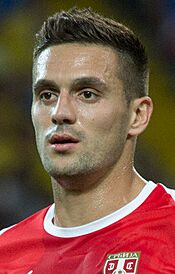
| Rank | Player | Caps | Goals | Pos. | Career |
|---|---|---|---|---|---|
| 1 | Dušan Tadić | 111 | 23 | MF | 2008–2024 |
| 2 | Branislav Ivanović | 105 | 13 | DF | 2005–2018 |
| 3 | Dejan Stanković | 103 | 15 | MF | 1998–2013 |
| 4 | Savo Milošević | 102 | 37 | FW | 1994–2008 |
| 5 | Aleksandar Mitrović | 100 | 62 | FW | 2013–present |
| 6 | Aleksandar Kolarov | 94 | 11 | DF | 2008–2020 |
| 7 | Dragan Džajić | 85 | 23 | MF | 1964–1979 |
| 8 | Dragan Stojković | 84 | 15 | MF | 1983–2001 |
| Vladimir Stojković | 84 | 0 | GK | 2006–2018 | |
| 10 | Zoran Tošić | 76 | 11 | MF | 2007–2016 |
Top Goal Scorers
| Rank | Player | Goals | Caps | Ratio | Career |
|---|---|---|---|---|---|
| 1 | Aleksandar Mitrović | 62 | 100 | 0.62 | 2013–present |
| 2 | Stjepan Bobek | 38 | 63 | 0.60 | 1946–1956 |
| 3 | Milan Galić | 37 | 51 | 0.73 | 1959–1965 |
| Blagoje Marjanović | 37 | 58 | 0.64 | 1926–1938 | |
| Savo Milošević | 37 | 102 | 0.36 | 1994–2008 | |
| 6 | Rajko Mitić | 32 | 59 | 0.54 | 1946–1957 |
| 7 | Dušan Bajević | 29 | 37 | 0.78 | 1970–1977 |
| 8 | Todor Veselinović | 28 | 37 | 0.76 | 1953–1961 |
| 9 | Predrag Mijatović | 27 | 73 | 0.37 | 1989–2003 |
| 10 | Borivoje Kostić | 26 | 33 | 0.79 | 1956–1964 |
Team Captains (Since 1994)
| Player | Period | Tournaments as the captain |
|---|---|---|
| Dragan Stojković | 1994–2001 | 1998 FIFA World Cup, UEFA Euro 2000 |
| Predrag Mijatović | 2001–2003 | — |
| Savo Milošević | 2003–2006 | 2006 FIFA World Cup |
| Dejan Stanković | 2006–2011 | 2010 FIFA World Cup |
| Nikola Žigić |
|
— |
| Branislav Ivanović | 2012–2017 | — |
| Aleksandar Kolarov | 2018–2020 | 2018 FIFA World Cup |
| Dušan Tadić |
2021–2024
|
2022 FIFA World Cup, UEFA Euro 2024 |
| Aleksandar Mitrović | 2024– | — |
Notable Players
- Goalkeepers
-
Ivica Kralj played for the team from 1996 to 2001.
-
Vladimir Stojković has played the most games as a goalkeeper for the team.
- Defenders
-
Siniša Mihajlović played 63 matches and later managed the team.
-
Zoran Mirković played for the team from 1995 to 2003.
-
Mladen Krstajić played 59 matches and managed the team at the 2018 World Cup.
-
Nemanja Vidić played 56 matches and was part of two World Cups.
-
Neven Subotić played 36 matches and was part of the 2010 World Cup.
-
Branislav Ivanović played 105 matches for the team.
-
Aleksandar Kolarov played 94 matches and was captain at the 2018 World Cup.
- Midfielders
-
Dragan Stojković played for the team from 1983 to 2001 and is the current head coach.
-
Dejan Savićević played for the team from 1986 to 1999 and managed the team later.
-
Vladimir Jugović played for the team from 1991 to 2002.
-
Dejan Stanković played in three World Cups and one European Championship.
-
Miloš Krasić played for the team from 2006 to 2011.
-
Nemanja Matić played for the team from 2008 to 2019.
-
Dušan Tadić has played the most games for the team with 111 caps.
- Forwards
-
Predrag Mijatović was a top goal scorer in the 1998 World Cup qualifiers.
-
Savo Milošević played 102 matches, scored 37 goals, and was a top scorer at Euro 2000.
-
Darko Kovačević played 59 matches and scored 10 goals.
-
Mateja Kežman was the top goal scorer for the team in the 2006 World Cup qualifiers.
-
Nikola Žigić played 57 matches and scored 20 goals.
-
Dušan Vlahović has been playing for the team since 2020.
Competition Records
Serbia is seen as the direct successor to the Yugoslavia and Serbia and Montenegro national football teams by FIFA and UEFA. This means all their past records are now part of Serbia's history.
FIFA World Cup Appearances
Serbia at the FIFA World Cup
UEFA European Championship Appearances
Serbia at the UEFA European Championship
UEFA Nations League Performance
| UEFA Nations League record | ||||||||||
|---|---|---|---|---|---|---|---|---|---|---|
| Season | Division | Group | Pld | W | D | L | GF | GA | P/R | RK |
| 2018–19 | C | 4 | 6 | 4 | 2 | 0 | 11 | 4 | 27th | |
| 2020–21 | B | 3 | 6 | 1 | 3 | 2 | 9 | 7 | 27th | |
| 2022–23 | B | 4 | 6 | 4 | 1 | 1 | 13 | 5 | 19th | |
| 2024–25 | A | 4 | 8 | 2 | 4 | 2 | 6 | 7 | 10th | |
| Total | 26 | 11 | 10 | 5 | 39 | 23 | 10th | |||
Team Achievements
Major Competitions
- UEFA European Championship
 Runners-up (2): 1960, 1968
Runners-up (2): 1960, 1968
- Olympic Games
Regional Competitions
- Balkan Cup
- Winners (2): 1934–35, 1935
- Mediterranean Games
- Gold medal (2): 1971, 1979
Friendly Tournaments
- 1945 Yugoslav Football Tournament
- Champions (1): 1945
- Lunar New Year Cup
- Champions (1): 1995
- Millennium Super Cup
- Champions (1): 2001
Awards
Summary of Major Medals
| Competition | Total | |||
|---|---|---|---|---|
| FIFA World Cup | 0 | 0 | 0 | 0 |
| Olympic Games | 1 | 3 | 1 | 5 |
| UEFA European Championship | 0 | 2 | 0 | 2 |
| Total | 1 | 5 | 1 | 7 |
See also
 In Spanish: Selección de fútbol de Serbia para niños
In Spanish: Selección de fútbol de Serbia para niños
- Serbia national football team results
- Serbia and Montenegro national football team results
- Serbia national under-21 football team
- Serbia national under-20 football team
- Serbia national under-19 football team
- Serbia national under-17 football team
- List of Serbia international footballers (including predecessor teams)
- Yugoslavia national football team
- Serbia and Montenegro national football team
 | Mary Eliza Mahoney |
 | Susie King Taylor |
 | Ida Gray |
 | Eliza Ann Grier |


